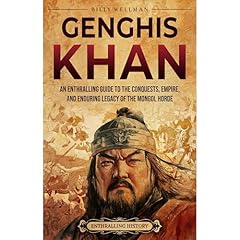
Genghis Khan and the Making of the Modern World
No se pudo agregar al carrito
Add to Cart failed.
Error al Agregar a Lista de Deseos.
Error al eliminar de la lista de deseos.
Error al añadir a tu biblioteca
Error al seguir el podcast
Error al dejar de seguir el podcast
 Exclusivo para miembros Prime: ¿Nuevo en Audible? Obtén 2 audiolibros gratis con tu prueba.
Exclusivo para miembros Prime: ¿Nuevo en Audible? Obtén 2 audiolibros gratis con tu prueba.Compra ahora por $22.81
-
Narrado por:
-
Jonathan Davis
-
Jack Weatherford
-
De:
-
Jack Weatherford
The Mongol army led by Genghis Khan subjugated more lands and people in 25 years than the Romans did in 400. In nearly every country the Mongols conquered, they brought an unprecedented rise in cultural communication, expanded trade, and a blossoming of civilization.
Vastly more progressive than his European or Asian counterparts, Genghis Khan abolished torture, granted universal religious freedom, and smashed feudal systems of aristocratic privilege. From the story of his rise through the tribal culture to the explosion of civilization that the Mongol Empire unleashed, this brilliant work of revisionist history is nothing less than the epic story of how the modern world was made.
PLEASE NOTE: When you purchase this title, the accompanying PDF will be available in your Audible Library along with the audio.
Listen to An Interview with Author Jack Weatherford.©2005 Jack Weatherford (P)2010 Audible, Inc.Los oyentes también disfrutaron:




















Reseñas de la Crítica
Featured Article: The Best Biography Audiobooks to Educate, Fascinate, and Inspire
The best biographies are ranked not only by the scale and skill of their writing, but also by the strength of their subjects. In the audiobook world, these selections are also judged for the quality of their narrative performances, making those that rise to the top all the more excellent. From lighthearted entertainment to inspirational origin stories, these titles represent the best biography audiobooks now ready for your listening pleasure.

Editor's Pick
Even if you don’t pick up this title, please say ‘JENG-iss.’
"As an anthropologist studying and teaching in Mongolia for decades, Jack Weatherford collected stories: the facts of Genghis Khan’s life (few, but significant), his legacy (huge), and the intimacy and specialness of Mongolian culture that changed and spread across the world under his aegis. Jonathan Davis’s stellar narration of every novelistic detail guarantees that this audio is the BEST. HISTORY. EVER."
—Christina H., Audible Editor
Las personas que vieron esto también vieron:


















The best history book that I've ever heard
Se ha producido un error. Vuelve a intentarlo dentro de unos minutos.
very informative, great story
Se ha producido un error. Vuelve a intentarlo dentro de unos minutos.
A must for anyone interested in history.
Se ha producido un error. Vuelve a intentarlo dentro de unos minutos.
If you could sum up Genghis Khan and the Making of the Modern World in three words, what would they be?
informative, enlightening, engagingWhat did you like best about this story?
This book brought flesh and bones to names we all recognize. I was fascinated by the many things Genghis Khan brought to us. I also appreciated the honesty of the writer concerning Genghis Khan's personal failure as a father and how it impacted his legacy.What about Jonathan Davis and Jack Weatherford ’s performance did you like?
It was very easy to listen to this book for long spells at a time.If you were to make a film of this book, what would be the tag line be?
Epic story of a great leader.Any additional comments?
I try to read nonfiction once in a while to balance my leaning toward dark fiction. This book was a surprise. It was so interesting. I found myself telling my husband about Genghis Khan over coffee in the morning, poor man. I really got caught up in the story. The end of the book is a bit sad as his children and grandchildren were not able to carry on his values.surprisingly entertaining
Se ha producido un error. Vuelve a intentarlo dentro de unos minutos.
I never would have believed it!
Se ha producido un error. Vuelve a intentarlo dentro de unos minutos.



